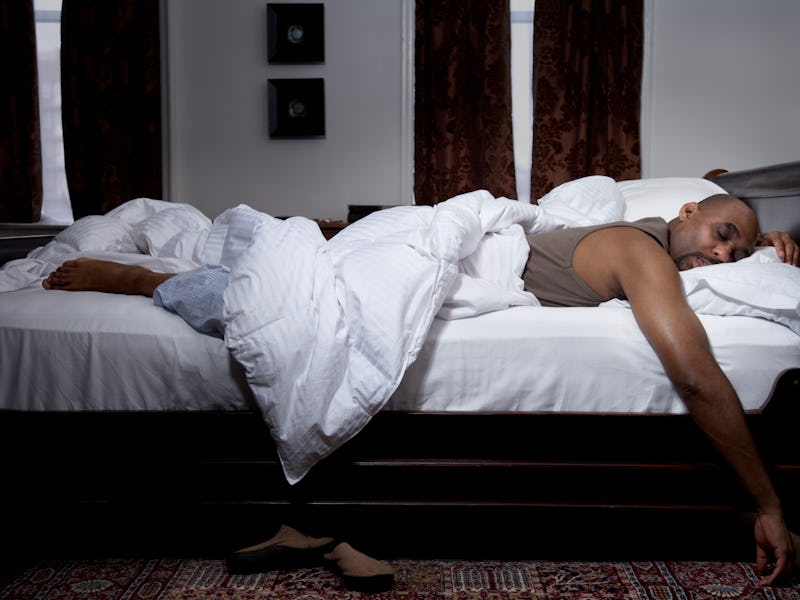This simple habit could significantly boost your heart health
A checklist used to predict cardiovascular health now includes sleep as its eighth measure.

An apple a day to keep the doctor away? Perhaps the more up-to-date saying should be: Eight hours a night to keep up the heart disease fight, according to a study published this week in the journal of the American Heart Association.
It makes sense that getting quality shuteye is essential for our overall health. Poor sleep hygiene can compromise our immune systems, affect our metabolisms, disrupt cognitive functions, and is a risk factor for heart attack and stroke.
Despite this compelling evidence, sleep wasn’t on the American Heart Association’s checklist for improving and maintaining cardiovascular health. The list, called Life’s Simple 7 (LS7), was developed in 2010 and focuses on seven domains: tobacco use, diet, physical activity, body mass index, blood pressure, total cholesterol, and fasting blood sugar.
In June of this year, the organization finally inducted sleep into the checklist, now dubbed Life’s Essential 8TM. Research leading the charge, which was published last week, found that if sleep was factored in, the list could more accurately predict a person’s risk for future cardiovascular diseases.
“This study provides compelling evidence that sleep metrics are an important factor in cardiovascular health,” David Goff, director of the Division of Cardiovascular Science at the National Heart, Lung, and Blood Institute, who was not part of the study, said in a press release.
Since its inception in 2010, American Heart Association's checklist for cardiovascular health — Life’s Simple 7 — did not include sleep.
How they did it — Researchers at Columbia University’s Mailman School of Public Health analyzed sleep records from around 2,000 middle-aged or older adults from the Multi-Ethnic Study of Atherosclerosis Sleep Exam (MESA Sleep), and tracked any mention of cardiovascular events like heart attack or stroke.
A subset of the original 6,000 participants within the original MESA cohort established in 2000, these individuals underwent an overnight polysomnograph, which measures brain activity, blood oxygen levels, heart rate, breathing, as well as eye and leg movements. They also had to wear a Fitbit-like sleep tracker for a week to record body movements and completed a sleep questionnaire regarding sleep and napping habits, among other lifestyle questions.
What they found — When formulating cardiovascular health scores using LS7, the researchers found it wasn’t significantly associated with cardiovascular disease. However, when sleep was factored in as a metric — particularly different dimensions such as duration, efficiency, regularity, daytime sleepiness, and sleep disorders — researchers could more accurately predict cardiovascular health.
The researchers were also able to quantify just how important sleep is to our heart’s health. Those who scored the highest on the Life’s Essential 8 checklist halved their risk for cardiovascular events compared to folks who scored on the lower side. In particular, how long (more than seven but less than nine hours) and how well a person slept had the biggest influence.
A 2020 survey conducted by National Sleep Foundation found that most Americans “feel sleepy on average three times a week, with 62 percent trying to ‘shake it off’ as their primary response.”
“Our results demonstrate that sleep is an integral component of [cardiovascular health]. In our study, even a [cardiovascular health] score that includes only sleep duration, the most widely measured aspect of sleep health and the most feasible measure to obtain in a clinic or public health setting, predicted CVD incidence,” Nour Makarem, an assistant professor of epidemiology at Columbia Mailman School of Public Health and lead author of the study, said in the press release.
“Notably, we also found that a [cardiovascular health] score that incorporated multiple dimensions of sleep health was also significantly associated with incident CVD. Our results highlight the importance of embracing a holistic vision of sleep health that includes sleep behaviors and [other milder sleep issues] rather than strictly focusing on sleep disorders when assessing an individual’s cardiovascular risk.”
Why it matters — To put it simply, poor heart health and poor sleep are ubiquitous throughout the U.S., as well as the rest of the world.
According to the U.S. Centers for Disease Control and Prevention, heart disease is the leading cause of death for both men and women with one person dying of it every 34 seconds. The risks and burden rises among various minority populations, such as Blacks and American Indians, due to conditions like hypertension, obesity, and other predisposing medical conditions, as well as social inequities in health care.
Add to that, most of us aren’t sleeping well at all. A 2020 survey conducted by National Sleep Foundation found that most Americans “feel sleepy on average three times a week, with 62 percent trying to ‘shake it off’ as their primary response.” In the new study, the researchers found about 63 percent of participants slept less than seven hours a night while 30 percent slept less than six hours.
Forgoing much needed rest hurts us even more as we get older, according to a study also published this week in the journal PLOS Medicine. Surveying sleep data of more than 7,000 men and women from the U.K.’s Whitehall II cohort study (also known as the Stress and Health Study), researchers in France and the U.K. found that adults over age 50 who slept for five hours or less a night appeared to have a greater risk of developing multiple chronic conditions compared to peers who slept seven hours, a risk that seemed to increase with advancing age.
“Recognizing sleep as an integral part of heart health is a transformative step toward reducing the global burden of cardiovascular disease, the leading cause of death, and reducing health disparities associated with it,” said Goff.